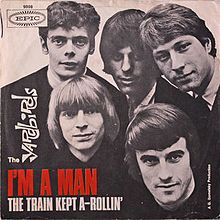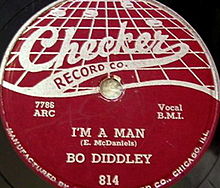I’m a Man (Bo Diddley song)
A-side “Bo Diddley”
Released April 1955
Format 10-inch 78 rpm & 7-inch 45 rpm records
Recorded Chicago, March 2, 1955
Genre Rhythm and blues
Length 2:59
Label Checker
Songwriter(s) Ellas McDaniel a.k.a. Bo Diddley
Producer(s) Leonard Chess, Phil Chess, Bo Diddley
“I’m a Man” is a rhythm and blues song written and recorded by Bo Diddley in 1955. A moderately slow number, it was inspired by an earlier blues song and became a number one U.S. R&B chart hit. “I’m a Man” has been recorded by a variety of artists, including the Yardbirds who had a number 17 pop hit in the U.S. in 1965.
“I’m a Man” was released as the B-side of “Bo Diddley”, his first single in April 1955. The single became a two-sided hit and reached number one in the Billboard R&B chart. “I’m a Man” was inspired by Muddy Waters’ 1954 song “Hoochie Coochie Man”, written by Willie Dixon. After Diddley’s release, Waters recorded an “answer song” to “I’m a Man” in May 1955, titled “Mannish Boy”, a play on words on Bo Diddley’s younger age as it related to the primary theme of the song.
Backing Diddley (vocals and guitar) are Billy Boy Arnold (harmonica), Otis Spann (piano), Jerome Green (maracas), Willie Dixon (double bass), and either Frank Kirkland or Clifton James (drums). In a Rolling Stone magazine interview, Bo Diddley recounts that the song took a long time to record because of confusion regarding the timing of the “M … A … N” vocal chorus. The song is included on several of his compilation albums, including Bo Diddley (1958) and His Best (1997). He also recorded it with Muddy Waters and Little Walter for the 1967 Super Blues album.
related to the primary theme of the song.
Backing Diddley (vocals and guitar) are Billy Boy Arnold (harmonica), Otis Spann (piano), Jerome Green (maracas), Willie Dixon (double bass), and either Frank Kirkland or Clifton James (drums). In a Rolling Stone magazine interview, Bo Diddley recounts that the song took a long time to record because of confusion regarding the timing of the “M … A … N” vocal chorus. The song is included on several of his compilation albums, including Bo Diddley (1958) and His Best (1997). He also recorded it with Muddy Waters and Little Walter for the 1967 Super Blues album.
The Yardbirds versions
related to the primary theme of the song.
Backing Diddley (vocals and guitar) are Billy Boy Arnold (harmonica), Otis Spann (piano), Jerome Green (maracas), Willie Dixon (double bass), and either Frank Kirkland or Clifton James (drums). In a Rolling Stone magazine interview, Bo Diddley recounts that the song took a long time to record because of confusion regarding the timing of the “M … A … N” vocal chorus. The song is included on several of his compilation albums, including Bo Diddley (1958) and His Best (1997). He also recorded it with Muddy Waters and Little Walter for the 1967 Super Blues album.
The Yardbirds versions
B-side “Still I’m Sad”
Released October 6, 1965 (U.S.)
Format 7-inch 45 rpm record
Recorded
September 19, 1965
September 21–22, 1965
Studio
Chess, Chicago
Columbia, New York City
Genre Blues rock
Length 2:37
Label Epic
Songwriter(s) Ellas McDaniel a.k.a. Bo Diddley
Producer(s) Giorgio Gomelsky
English rock band the Yardbirds recorded a live version of “I’m a Man” for their first UK album Five Live Yardbirds with Eric Clapton in 1964 (later released in the U.S. on the Having a Rave Up album). In 1965 during their first American tour, the Yardbirds with Jeff Beck on guitar, recorded a studio version of “I’m a Man”. Their versions feature their signature “rave-up” arrangement, when the beat shifts into double time and the instrumentation builds to a crescendo. Beck added a “scratch-picking”[6] technique to produce a percussive effect during the song’s instrumental section, which critic Cub Koda notes “provides the climax on the studio version of ‘I’m a Man’, perhaps the most famous Yardbirds rave-up of all”.[7]
Recording took place at the Chess Studios in Chicago, with additional recording at the Columbia Studios in New York. It was released as a single and later included on their 1965 Epic Records album Having a Rave Up. The Yardbirds’ version (with “Still I’m Sad” as its B-side, released by Epic Records in the U.S.) peaked at number 17 on the Billboard Hot 100 in 1965. The song was later released in the UK in 1976. Diddley praised their cover as “beautiful and it has been called “a defining moment for the band”.
In addition to the 1964 live version with Clapton, other live versions include those with Jeff Beck (1965 Yardbirds …On Air, released 1991) and Jimmy Page (1968 Live Yardbirds: Featuring Jimmy Page, released 1971).
English rock band the Yardbirds recorded a live version of “I’m a Man” for their first UK album Five Live Yardbirds with Eric Clapton in 1964 (later released in the U.S. on the Having a Rave Up album). In 1965 during their first American tour, the Yardbirds with Jeff Beck on guitar, recorded a studio version of “I’m a Man”. Their versions feature their signature “rave-up” arrangement, when the beat shifts into double time and the instrumentation builds to a crescendo. Beck added a “scratch-picking” technique to produce a percussive effect during the song’s instrumental section, which critic Cub Koda notes “provides the climax on the studio version of ‘I’m a Man’, perhaps the most famous Yardbirds rave-up of all”.
Recording took place at the Chess Studios in Chicago, with additional recording at the Columbia Studios in New York. It was released as a single and later included on their 1965 Epic Records album Having a Rave Up. The Yardbirds’ version (with “Still I’m Sad” as its B-side, released by Epic Records in the U.S.) peaked at number 17 on the Billboard Hot 100 in 1965. The song was later released in the UK in 1976. Diddley praised their cover as “beautiful”[8] and it has been called “a defining moment for the band”.
In addition to the 1964 live version with Clapton, other live versions include those with Jeff Beck (1965 Yardbirds …On Air, released 1991) and Jimmy Page (1968 Live Yardbirds: Featuring Jimmy Page, released 1971).
From Wikipedia, the free encyclopedia


